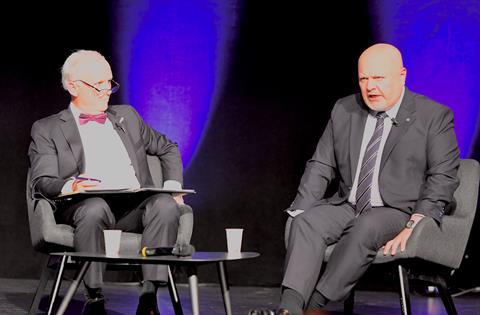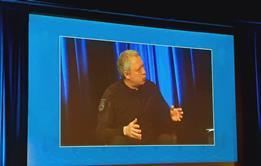The principle of proportionality 'is not an optional extra' in culpability for war crimes, the chief prosecutor of the International Criminal Court said yesterday in a clear reference to Israel's responses to the 7 October terrorist massacre. Addressing a packed session of the International Bar Association, Karim Khan KC said the Hague court was required to investigate the 7 October attacks - but that he would not 'act precipitously'.
Khan was speaking as the IBA's Human Rights Institute called for 'an immediate ceasefire' in the Israel Gaza conflict along with the creation of humanitarian corridors and civilian safe havens. It urged all parties 'to take appropriate steps to remove children from harm'.
The Gaza conflict, along with the continuing war in Ukraine, dominated Khan's hour-long conversation with IBA members, moderated by IBA executive director Mark Ellis.

Responding to a question from a former IBA president, David W. Rivkin of New York firm Debevoise & Plimpton, Khan declined to set a legal definition of proportionality. The principle needs to envisage different situations, he said: while it would be disproportionate to kill 10,000 inhabitants of a building in pursuit of a handful of terrorists ‘if someone in the basement has a trigger to a nuclear bomb, then it becomes arguable’.
'So much is dependent on the facts, and the effort of the targeting party [to avoid unnecessary casualties], then it has to be assessed on the facts of the case.’
However Khan noted that the laws of war impose an 'absolute prohibition' on hostage-taking. The ICC has an obligation to investigate the 7 October atrocities, he said 'and ways have to be found to overcome the obstacles, which are not unique to Palestine and Israel.'
However asked whether the court would accelerate its process in the case of Hamas, Khan said. 'I won't act precipitously.' He called on both sides in the conflict to 'calm down the tribalism which enables people to ignore humanity'.
On Ukraine, Khan rejected calls for a special tribunal to tackle the crime of aggression. 'We have to be very sensitive to accusations of double standards,' he said, referring to the 2003 US-led invasion of Iraq. 'You have to work with the law you've got.'
A way forward in the future, he said, might be to amend the 1998 Rome Statute which set up the ICC to create a standard prohibition to apply to all countries, rather than reacting to specific events.
On the US's refusal to sign up to the court, Khan said he had told Congress that the Rome Statute's values 'are quintessential US values. We are on a constructive engagement,' he said.
On the overall role of international law, Khan said 'People need to feel that the insittutions value lives equally. What they want to see is not the niceties of jurisprudence but that their lives matter, that they're not too small or too poor to be visible.'
'One of the best balms to the voices of hate is justice,' he said.
IBA 2023: Ukraine seeking watertight 'evidentiary base' for genocide charge

‘They want to dehumanise us’: conference also hears emotionally charged exchange between Ukraine’s chief prosecutor and the head of Israel’s bar on dealing with alleged perpetrators of atrocities.
- 1
- 2
 Currently
reading
Currently
reading
IBA 2023: Proportionality 'not an optional extra' says ICC prosecutor as human rights institute calls for Gaza ceasefire
- 4
- 5
- 6
- 7







































